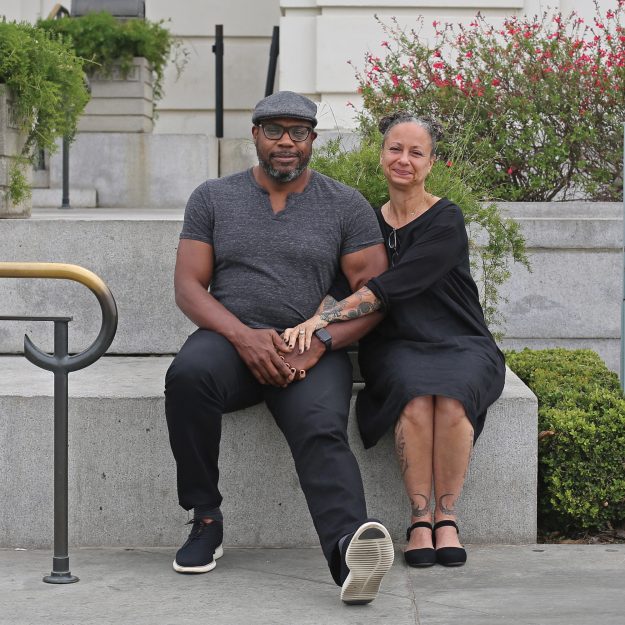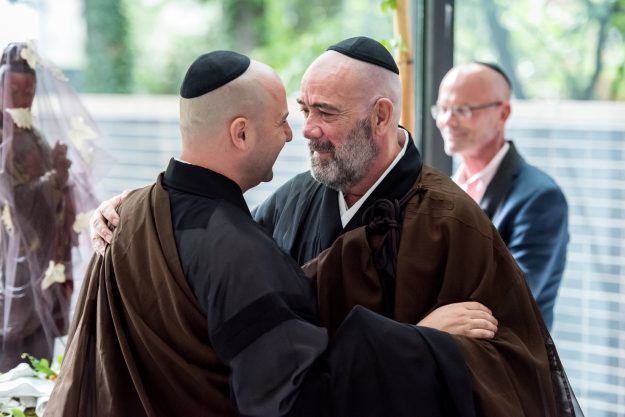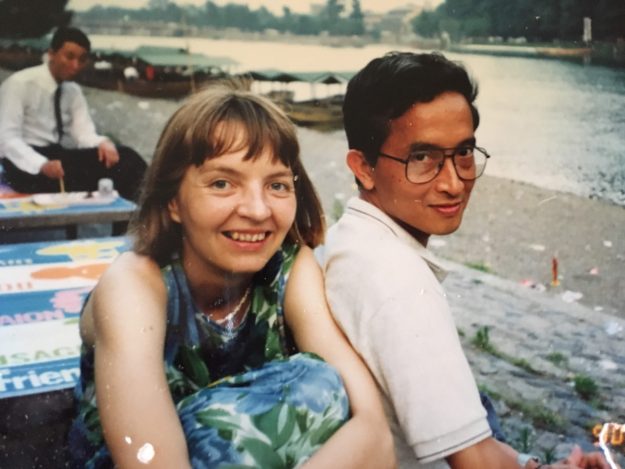JoAnna Hardy & Andre Hardy
JoAnna is cofounder of Meditation Coalition and sits on the teachers’ council at Spirit Rock Meditation Center. Andre is the sports editor for TribeLA Magazine and a novelist.
Years together: 4 | Tradition: Theravada

Where did you meet?
Andre Hardy (AH): On Tinder.
JoAnna Hardy (JH): We got some crap for it, but I’m a dharma teacher, and it’s really hard to reach out of the community to find people to date. So I threw the net out wide.
Why did you swipe right?
AH: It had to do with her approach to life and the connection to meditation and Buddhism.
When we met, I said to JoAnna, “Have you heard of this guy named Jack Kornfield? Because I’ve been listening to his book.” She said, “That’s my mentor.” I was like, yeah, this is the woman I need to be with right here.
Do you think the Buddhist teachings have a role to play in romantic love?
JH: I definitely do. The first thing that comes to me is the beauty of renunciation in relationship—the renunciation of self-involvement, the renunciation of doing whatever I want whenever I want. And also the commitment of practice, whether it be seated meditation or our relationship, both take the same kind of intention, energy, and effort.
Which teachings do you draw on when approaching your partner?
JH: The precepts, especially wise speech.
AH: It’s a rule of mine that when I am triggered, I wait. It might take a day or a week to dig through and get to what exactly is bothering me, and often it turns out to be old stuff that has nothing to do with our relationship.
How about Buddhist teachings that are not helpful when it comes to love?
JH: Who knows who actually wrote them and in what era, but I don’t appreciate certain suttas that speak about women—
AH: Like about the man being in charge? See, those are the ones that I like. Those are the ones that work really well for me. [Laughs.]
JH: They don’t work for me! [Laughs.] Also, many times there’s a misunderstanding or some kind of spiritual bypass of thinking we’re not meant to get angry or be sensual or sexual or have too much pleasure. I’ve watched so many people get thrown out of whack around that.
What’s your relationship advice for others in one sentence or less?
JH: This is really cliché, but to just be kind. There’s no reason to fight. This is your home; take care of it. There’s plenty of shit on the streets.
AH: Specifically for men, if you can find a way to be vulnerable, you have an opportunity to have a very loving relationship, with kindness you can usually only dream of.
Koshin Paley Ellison & Robert Chodo Campbell
Koshin and Chodo are cofounders of the New York Zen Center for Contemplative Care.
Years together: 18 | Tradition: Zen

How did you meet?
Koshin Paley Ellison (KPE): We saw each other 24 years ago doing kinhin [walking meditation]. I remember when he walked into the meditation center, I knew that my whole life was going to change. But we didn’t speak that night.
Robert Chodo Campbell (RCC): Fast forward six years later: I had married another man, and six months after we had had a big wedding in Australia, I saw Koshin again. The arrow of Eros was shot through my heart. All my friends were saying, you’re crazy, this is an infatuation. So I said to Koshin, “Can we just have an affair?”
Koshin said, “Absolutely not. If you want a relationship with me, then you have to make your decision.”
Aside from your professional life running a center together, in what ways do you see your romantic relationship intersecting with the dharma?
KPE: The practice allows us to honor space for the other person. Even with disagreements—whether it has to do with laundry or the kitty litter—
RCC: The kitty litter. That’s a big area. [Laughs.]
KPE: It’s a big, big area. [Laughs.] Even with those disagreements, it’s our willingness to stay in relationship and not hold on to our rightness. Or even if we do, we can hang out together and know that that will eventually soften.
Or another dharma thing at home is that I wake up very early, and Chodo is usually still sleeping. I have this awareness of never wanting to leave without it being total and complete. So I whisper in his ear as he’s sleeping. Sometimes he wakes up, sometimes he doesn’t. Part of my practice is to make sure each day that I appreciate him and my love for him.
RCC: And what do you say? Tell her what you say. Oh, now he’s crying. Every morning he says, “I love you. You’re my treasure.”
Maria Reis Habito & Ruben Habito
Ruben and Maria are Zen teachers at the Maria Kannon Zen Center in Dallas, Texas.
Years together: 29 | Tradition: Zen and Catholicism

When did you get married?
Maria Reis Habito (MRH): That is a complicated story, because Ruben was a Jesuit priest when we met at a conference in 1987. He decided to leave the priesthood in 1989, and then he got an offer to teach theology here in Dallas at Southern Methodist University. We decided to stay one year apart to find out if this was really a good idea to spend the rest of our life together. It needed some deeper reflection.
Ruben Habito (RH): Maria decided to take the big leap and came to Dallas in March of 1990. We got married in April.
Since you’re grounded in two traditions, what are the teachings from either Buddhism or Christianity that you find most relevant to sustaining a romantic partnership?
MRH: I think the spiritual foundation is very important. The Catholic teaching is that you want to stay together, you want to make this work, you want to take care of your family.
RH: I would say that it’s not so much the teaching but the practice, and the practice that we share is sitting in meditation. In those moments when one is truly absorbed and taken up in the stillness, you can see clearly what is important in life.
Do you find points of tension between the Buddhist teachings and romantic love?
MRH: I’m the translator for Dharma Master Hsin Tao, the main teacher at a monastery in Taiwan. The nuns there were utterly shocked when they heard that I was going to get married, because they had thought I would take the path of enlightenment and become a nun. Meeting Ruben assured them, but they really thought I had been lost.
RH: From a theoretical perspective, there are all of these injunctions in Buddhism about romantic love as an attachment, as something that will take you off the path. That is something that needs to be clarified.
The foundation stone of the Christian faith, of saying that God is love, is also the source for saying that romantic love is also from God, and it’s not to be disdained but to be seen in the larger context of your entire life and all the other kinds of love in it. As long as it does not contradict any of the other types of love, then it is something that is to be cultivated in a wholesome way, and celebrated.
Any last thoughts?
MRH: Just that I travel often, and every time I come back, the house is full of fresh flowers and a bottle of champagne and chocolates. So after 29 years, there is still this romantic aspect, which I am grateful for.
Thank you for subscribing to Tricycle! As a nonprofit, we depend on readers like you to keep Buddhist teachings and practices widely available.